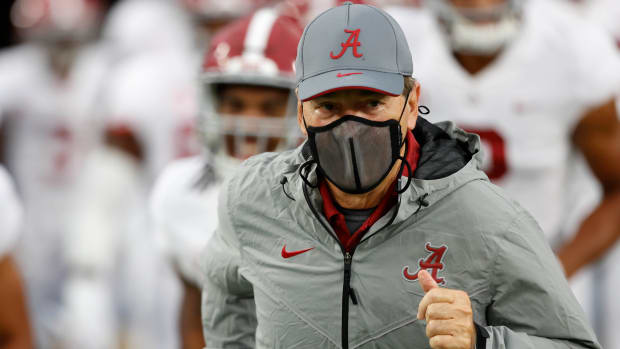It was an absolute certainty that this college football season would face major logistical complications, and that certainty has spread everywhere now.
America wanted football during a pandemic. Needed football during a pandemic. Demanded football during a pandemic.
Well, this is what we get with football in a pandemic: a COVID-19 forest fire that keeps gathering oxygen. A Game of the Year on the brink. A cascade of cancellations, postponements and rearrangements.
This was expected and predicted by many; downplayed and disregarded by some. It was an absolute certainty that this season would face major logistical complications, and that certainty has spread everywhere now. It’s almost as if transporting a cohort of 150–200 people from one town to another on overnight trips for full-contact competition was asking for trouble. Adding tens of thousands of fans to the equation might even be considered playing with fire.
Fortunately, we are still far short of the worst-case scenario, which would be a causal relationship between playing/coaching/attending football and serious illness or death. But actually going through the messiness of this autumn is jarring enough to question the wisdom of our national gamble to play.

Until October, upheaval had touched every level of the sport but the two highest: the National Football League and the Southeastern Conference. Now those two leagues have been burned. In fact, the marquee teams in those leagues specifically have been burned—the New England Patriots and the Alabama Crimson Tide. The
Patriots had their Week 5 game against Denver postponed, and the Tide had legendary coach Nick Saban test positive this week. (Alabama athletic director Greg Byrne also has tested positive.)Saban says he is asymptomatic and coached practice via Zoom call Wednesday. He then did a media call after practice to allay concerns and reinforce that he will still be on the job as much as allowed this week. But the most accomplished coach in college football, and arguably the greatest of all-time, will not be on the Bryant-Denny Stadium sideline for the showdown of No. 2 Alabama vs. No. 3 Georgia.
As of Wednesday night, the game is still scheduled, though there is another round of tests to come for both teams. Two other SEC games already have been postponed this week: Vanderbilt at Missouri and LSU at Florida. The latter postponement was a comeuppance for Gators coach Dan Mullen, who days earlier called for his school to “pack The Swamp” with 90,000 fans for the LSU game—one of the most reckless statements anyone in college football has made this year.
Fact: Without a bubble, there is trouble. The NBA pulled off its Orlando bubble remarkably well—miraculously, even. The NFL couldn’t bubble its season, and college football sure as hell couldn’t, and we’re seeing the messy results of that shortcoming.
College football, conflicted for months on what to do, ultimately forged onward. In some locales, the jocks and the politicians joined forces to browbeat university and conference administrators into playing. Schools performed ethical backbends, pushing on with practices and games while campuses shut down.
Before this week, more than two-dozen college games had been postponed or canceled. Now the SEC has upped the number, and with more problems on the horizon.
That league smartly delayed its season until Sept. 26, predicting a surge of cases when students returned to its 14 campuses in August. But it unwisely pushed ahead without rapid daily testing, which will be in place for the Big Ten and Pac-12 when those leagues kick off in the coming weeks. (Even daily testing isn’t airtight, as the NFL and others have learned.)
After being beaten senseless by the We Demand Football mob, Big Ten leadership might yet look like the smartest group in the college game for its cautious approach. Wouldn't that be rich? But it’s way too early to declare that, given the ripple effects of the virus through the sport.
One thing that seems increasingly clear: Road trips are perilous. Saban alluded to playing Mississippi in Oxford as a possible explanation for his positive test. “As soon as you travel, you get exposed to a lot more things and a lot more people,” he said. Florida experienced its outbreak on the heels of playing at Texas A&M.
The one potential virus vector nobody is willing to admit might be a problem are the games themselves. That seems like either wishful thinking, denial, or outright dishonesty.
Ole Miss came out of the Alabama game with unspecified COVID-19 issues, per coach Lane Kiffin. “We’re just trying to manage it the best we can,” he said. So did Saban. Coincidence? Maybe, maybe not.
Earlier this season, Arkansas State and Memphis both had to postpone or cancel multiple games after playing each other. Coincidence? Maybe, maybe not.
The powers that be know that outbreaks directly related to games would shut down the season. There might not be evidence of it, but you wonder how hard they would even look for it—or admit it if they found it.
Even if it doesn’t come to that—if the season can play out, however chaotically—this will in no way resemble anything you’d call “fair.” College football fans are the best in the world at screaming about unfairness, but they’re going to have to stifle that urge. Stuff is going to happen—stuff like sidelining a legendary coach for the biggest game of the season.
Then it will be up to the College Football Playoff selection committee to somehow sift through the tumult and declare who should play for a national championship. Would Alabama get a pass if it loses Saturday to Georgia? Would a Georgia victory lose some impact? It’s going to be a joke of a job, but somebody has to do it.
I guess somebody has to do it, since football was demanded and football has been played. But every week brings new setbacks, new complications, new alterations to the season.
You play the sport in a pandemic, you take your chances.


0 Comments